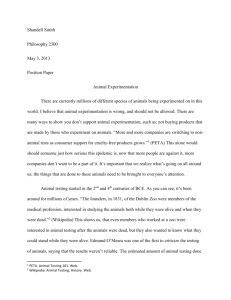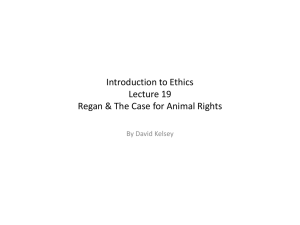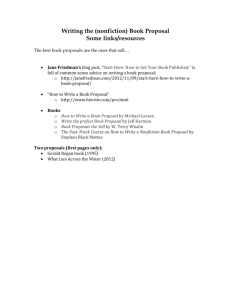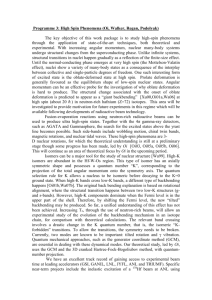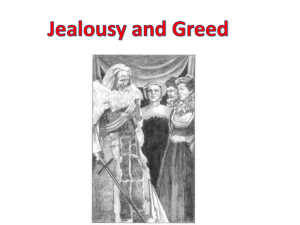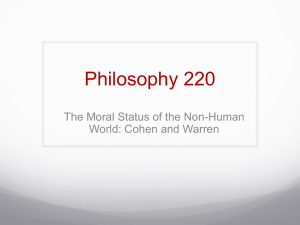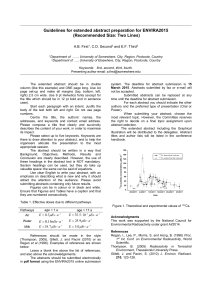Tom Regan's The Case for Animal Rights
advertisement
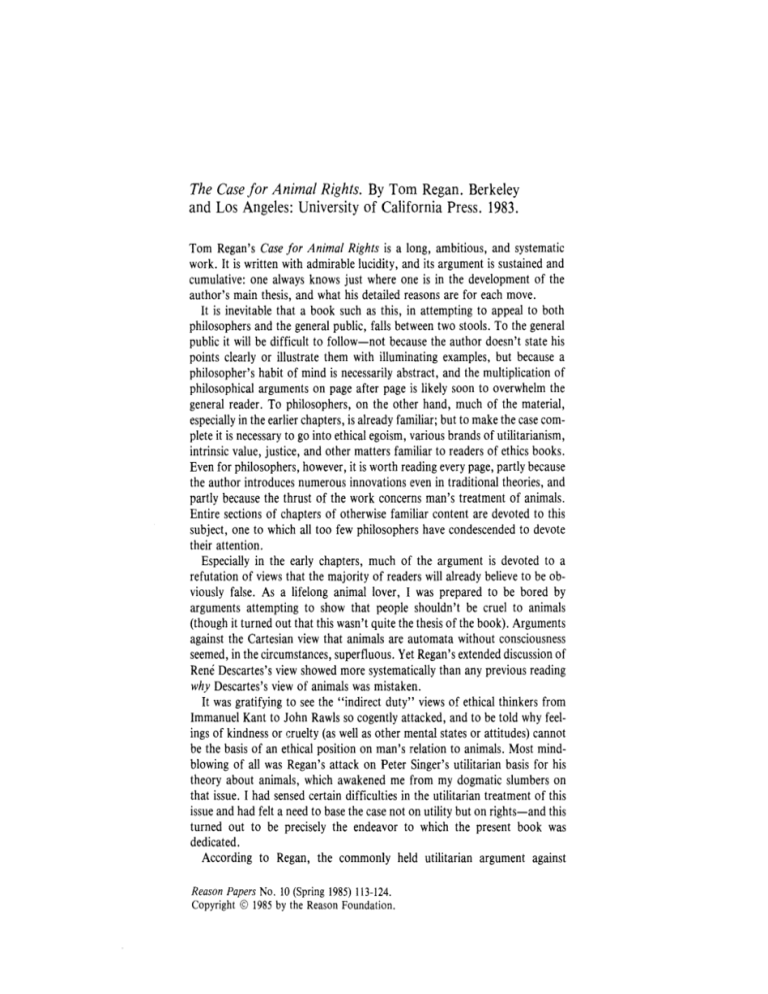
The Case for Animal Rights. By Tom Regan. Berkeley and Los Angeles: University of California Press. 1983. Tom Regan's Case for Animal Rights is a long, ambitious, and systematic work. It is written with admirable lucidity, and its argument is sustained and cumulative: one always knows just where one is in the development of the author's main thesis, and what his detailed reasons are for each move. It is inevitable that a book such as this, in attempting to appeal to both philosophers and the general public, falls between two stools. To the general public it will be difficult to follow-not because the author doesn't state his points clearly or illustrate them with iilumiriating examples, but because a philosopher's habit of mind is necessarily abstract, and the multiplication of philosophical arguments on page after page is likely soon to overwhelm the general reader. To philosophers, on the other hand, much of the material, especially in the earlier chapters, is already familiar; but to make the case complete it is necessary to go into ethical egoism, various brands of utilitarianism, intrinsic value, justice, and other matters familiar to readers of ethics books. Even for philosophers, however, it is worth reading every page, partly because the author introduces numerous innovations even in traditional theories, and partly because the thrust of the work concerns man's treatment of animals. Entire sections of chapters of otherwise familiar content are devoted to this subject, one to which all too few philosophers have condescended to devote their attention. Especially in the early chapters, much of the argument is devoted to a refutation of views that the majority of readers will already believe to be obviously false. As a lifelong animal lover, I was prepared to be bored by arguments attempting to show that people shouldn't be cruel to animals (though it turned out that this wasn't quite the thesis of the book). Arguments against the Cartesian view that animals are automata without consciousness seemed, in the circumstances, superfluous. Yet Regan's extended discussion of Rene Descartes's view showed more systematically than any previous reading why Descartes's view of animals was mistaken. It was gratifying to see the "indirect duty" views of ethical thinkers from Immanuel Kant to John Rawls so cogently attacked, and to be told why feelings of kindness or cruelty (as well as other mental states or attitudes) cannot be the basis of an ethical position on man's relation to animals. Most mindblowing of all was Regan's attack on Peter Singer's utilitarian basis for his theory about animals, which awakened me from my dogmatic slumbers on that issue. I had sensed certain difficulties in the utilitarian treatment of this issue and had felt a need to base the case not on utility but on rights-and this turned out to be precisely the endeavor to which the present book was dedicated. According to Regan, the commonly held utilitarian argument against Reason Papers No. 10 (Spring 1985) 113-124. Copyright O 1985 by the Reason Foundation. 114 REASON PAPERS NO. 10 mistreatment o f animals (for example, causing them pain) will not suffice. Not to herd animals into crowded pens, not to let them see the light of day, not to slaughter them carelessly by inflicting pain, are all to the good; but even if all such practices were instantly abolished, Regan's main objection would still remain: that animals are used to serve the ends of others (the ends of commercial growers, of meat-eaters, of hunters, of laboratory experimenters, etc.). When it is established that a creature is conscious, that it can experience pain and pleasure, that it has desires and expectations, memories, and beliefs, then the creature is what Regan calls the subject of a life. Once a creature has this status, its life may not be taken away, or injury inflicted on it, without violating respect for that life-and it is respect that is the basis for the attribution of (human and animal) rights. The lives of animals have inherent value, and are no more ours to use as we wish than are the lives of human beings; both are alike in being creatures with consciousness and feeling-they are all subjects-of-a-life. Using them as a means toward others' ends constitutes a violation of their rights. There are many accessory principles that Regan develops Rawls-like in the course of his argument, largely to meet objections: the harm principle, the freedom principle, the worse-off principle, the miniride principle, and others. Essential to Regan's argument are distinctions such as that between moral agents and moral patients, between intrinsic value and inherent value, and analyses of concepts such as justice, rights, utility, cruelty, and kindness. Indeed, there is an entire theory of normative ethics embodied in this work, which would make it worth reading even if one had no interest in its special application to animals. In order to make my remarks of finite length, howevereven if I were to describe in detail the argument of the book, that would be no substitute for reading it-I shall confine my remarks largely to the topic indicated by the book's title, the special application of his ethical theory to the concept of animal rights. REGAN'SHARMAND LIBERTYPRINCIPLES I am not at all sure how Regan's various principles, that is, the harm principle and the liberty principle, would mesh when applied to actual cases. But reflections on this topic would require me to spin out so many test-case examples that I shall confine my criticisms in this section to a few specific points: 1. Having presented the traditional problem of how bodily occurrences can causally affect mental ones and vice versa, and having exhibited the weaknesses of Descartes and the Occasionalists on the subject, Regan then consoles himself with the somewhat blithe assertion that "an evolutionary approach" solves the problem. I quite fail to see not only how it solves it, but how it ameliorates its force in the slightest degree. A sensation of dizziness impels me to leave a smoke-filled room; how does this conscious state cause my body to move out of the room? That the same problem is encountered also at "lower" levels of the evolutionary scale only extends it; it does not solve it. 2. When Regan is attacking Donald 0. Hebb (p. 42) on animal beliefs, he attacks the assertion that what the animal believes is that a certain English sentence is true; and of course he has an easy time with this, since animals cannot formulate or understand (as a rule) complete English sentences. Neither for that matter can the Portuguese who confronts a signpost written in REVIEWS 115 English. But if the animal believes something, it is surely not an English sentence, but rather the proposition that is expressed by that sentence and could be expressed by sentences in other languages. This is a rather oldfashioned way of speaking-propositions have been pretty much banned from the philosophical lexicon-but there was good reason for speaking of propositions rather than sentences, as the present example illustrates. Though the matter is too complex to discuss here, I would contend that beliefs-some beliefs at any rate-are nonlinguistic. This fact, if it is a fact, removes at least one barrier to the view that animals cannot have beliefs. It is, however, a matter of extreme difficulty to infer from an animal's behavior whether it has a belief. When a dog digs for a bone it has buried, does it believe that the bone is there? (Regan is surely right in saying that the dog has the concept of a bone, even though it is not the chemist's concept.) Does the fact that the dog wags its tail when its master's car approaches (without yet being able to see who is in it) entitle us to conclude that the dog believes its master is in the car? We would say a child has the belief, but does the dog? Perhaps it just acts as if it does? How rich a mental life can we safely attribute to dogs? They certainly have inclinations, and quite surely they have expectations. They are able to recognize objects and other creatures (largely through smell), but there are severe limits to this: they respond to Lassie's bark on television but not to her visage on the screen; they do not recognize two-dimensional representations of three-dimensional objects. Do they make decisions? (The dog ran around in the yard; is it correct to say that the dog decided to run around in the yard?) Do they weigh alternatives and then choose among them? One is inclined to say no, this is anthropomorphizing the dog's mental life too much. Still, the matter is disputable. When my dog is told to "come here" in a friendly tone of voice by two persons equally familiar to him sitting approximately equidistant from him in opposite directions, he always invents a flea and scratches for a few seconds before going toward the one guest or the other. If a person did this sort of thing, we would say he was "making up his mind" about which person to approach. I would give anything to know exactly what mental process is going on in the dog, but I cannot exclude the possibility that the dog is inventing a delaying tactic while trying to decide what to do. It certainly seems like a pretty good explanation of the dog's behavior. Thus it may be that a dog's mental life is even richer than Regan claims. But how can one be sure? The highly complex behavior of wolves, such as accepting a hands-up gesture by human beings as signalling that the struggle is over and peace has been declared, are so impressive that we are inclined to believe the wolf has a very complex mental life. Yet we are told that most of this behavior is "genetically programmed." I do not that either Regan or anyone else is in a position to make any claims on this point. 3. Regan strikes at the heart of utilitarianism when he attacks its aggregative concept of the good and (since the right act, according to utilitarians, is the one producing the highest net aggregate of good) of the right. His criticisms, rightly in my opinion, include rule-utilitarianism as well as actutilitarianism. One does not have to go so far as to insist on the total collapse of rule-utilitarianism into act-utilitarianism to see that in all the crucial cases in which rule-utilitarianism is presented as an alternative preferable to actutilitariansm, it fails. Thus, according to act-utilitarianism, it would be moral- 116 REASON PAPERS NO. 10 ly permissible to condemn an innocent man if the good effects on society more than counterbalanced the pain and distress to him (at least more than any alternative course of action.) Rule-utilitarianism was devised to take care of such counterintuitive results. But rule-utilitarianism no more succeeds in this than its predecessor, for any such rule as "Never knowingly convict an innocent person" would have to be qualified to read that if some great benefit to society were to occur as the result of the unjust conviction the rule would have to be revised to accommodate such cases. ("In this case and all cases relevantly similar to it, the rule would have to be revised to read. . ." etc.) I believe with Regan that such an outcome gives the coup de grgce to both forms of utilitarianism, and for the same basic reason, that utilitarianism is concerned with the aggregate rather than the individual: the lone individual is easily outnumbered, and what is required to protect the individual is rights. Nevertheless, it seems to me that Regan mischaracterizes utilitarianism in at least two respects: (a) The utilitarian theory of intrinsic value is incompletely presented. Regan skips from the classical hedonistic version of Jeremy Bentham and John Stuart Mill to the preference-utilitarianism of contemporary philosophers such as Peter Singer. But there is another theory of intrinsic value that he never mentions, and that might have made a difference to his allegation that "according to utilitarianism individuals are only receptacles into which value is poured." This is the view that there are other things besides pleasure (and satisfaction, happiness, and their cognates) that are intrinsically good, such as apprehension of beauty (not just pleasure taken in beauty), knowledge, and moral virtues, and that correspondingly there are other things that are intrinsically bad, e.g., envy and malice. This view has been held by some philosophers who professed utilitarianism (e.g., G. E. Moore) and by others who criticized it (C. D. Broad, Sir David Ross, C. A. Campbell). When Hastings Rashdall first introduced this brand of utilitarianism in his Theory of Good and Evil (1907), he called it "ideal utilitarianism," but Regan uses that name for a quite different theory. In any case, I wish that he had considered this pluralistic theory of intrinsic value, for a careful selection of traits of men and animals as intrinsically good might have made a difference to his own theory, as well as some of his criticisms of utilitarianism. (b) When considering preference-utilitarianism, Regan presents it as advocating a thesis that it need not advocate. In considering racism, for example, he says that if a store or factory has racist policies, and if racists outnumber nonracists sufficiently so that their aggregate interests outweigh those of the nonracists, then utilitarianism would in these circumstances advocate racism. But this follows only if one takes into consideration only what the interests and preferences of the racists at the present moment actually are. If, instead, one considers what they might be or could come to be, if one considers how much happiness utilitarian-style there would be if racist policies and interests were to change, then one would come out with a quite different result. Since utilitarianism is committed to considering the long future and not merely the present, and since people's preferences and interests d o change with time, a n alternative that utilitarians ought to consider is what the consequences would be if we had some success dealing with racist prejudices. Attitudes and preferences aren't as easy t o change as acts are, but they can in time be changed: even a person whose present interests lie largely in the pleasures of alcoholism may come in time, via Alcoholics Anonymous, for example, to REVIEWS have a new set of preferences in which alcohol no longer figures as an interest at all. (To make the discussion more complete, however, one would have to go into the multiple and overlapping ambiguities of the term "interest"-e.g., "X is one of my interests" vs. "X is to my interestw-which cannot be done here.) I shall now raise some points about the distinctive feature of Regan's ethical theory, the ethics of man's relation to other animals. I shall d o this more in the form of questions than outright criticisms. 1. What degree of sentience or awareness must a creature possess in order to be the subject-of-a-life, and thus be entitled to the respect due all such creatures? Regan includes all mammals, specifically mammals a year or more old. But most animal life is non-mammalian. Does it include reptiles? Birds? Fish? Insects? He confesses to not knowing this, and for good reason: (a) there are endless gradations in nature and it is difficult or impossible to draw precise boundary lines; and (b) we cannot make safe inferences from animal behavior to animal consciousness. (Human beings are, after all, mammals; perhaps some "lower" forms of life have experiences and ways of communicating that we don't understand.) He does condemn activities such as clubbing baby seals, but such condemnations may be the result of his advice to "err on the side of caution." The hesitation is understandable and doubt.less justified; still, if it is true it is very unfortunate, for where one draws the line is a matter that has enormous practical implications. If only mammals are included, then presumably it's all right to raise chickens for market (if they are given a comfortable life, etc.) but not cattle. And if fowl are included, what about fish? (Do insects feel pain or only exhibit avoidance-behavior?) My own preferred form of protein is fish; yet nothing in the book tells me whether one is acting immorally by catching and eating fish. Nor does he mention eggs. Since these are the product of chickens, and chickens are often (but not always) grown under crowded conditions on wire netting, presumably the eggs (at least the eggs hatched by those chickens) would be verboten also. But chickens surely lack the complexity of consciousness possessed by mammals, and perhaps they d o not fulfill the requirement of being subjects-of-a-life at all. Who can say? Regan at any rate does not say. But it makes an enormous practical difference to what according to Regan's view we should be permitted to eat. Should we eschew the meat of all animals, or only that of mammals? Should we be eggless vegetarians or are eggs all right? Since eggs are a complete protein, like animal flesh, it would make an enormous difference to our nutritional intake. But we are left to draw our own conclusions about this. 2. Regan is both careful and wise in criticizing aspects of utilitarian theory that depend on complex and dubious empirical assumptions. I am not sure that he is equally careful in the case of those empirical assumptions that tend to favor his view. I am not as sure as he is that medical experimentation and human disease-control could get along nicely without the use of experimental animals. (But this wouldn't matter to him: then, he would say, so much the worse for human disease-control.) I am also less confident than he is that 118 REASON PAPERS NO. 10 human health can be achieved just as well without the intake of complete proteins. People can live without these, but, I think, not as healthily or well; at the very least it is ever so much more difficult to design diets lacking meat and eggs, which yet contain the proper combination of proteins and amino acids. (See, for example, Richard Passwater's Super-nutrition; and Dr. Atkin's Diet Revolution.) At least, every physician known to me considers a meat-fowl-fish diet essential, and repudiates the authors cited by Regan on the other side. To avoid endless empirical dispute, however, I shall state my point in the form of a hypothetical question: Suppose that human life were impossible unless people ate the meat of animals; or suppose the span of human life would be cut by half, or that continued existence would be fraught with pain, misery, and disease. Suppose, in other words, that it's either-or: would Regan still insist that it is immoral to eat the flesh of animals? Should we die, or be ill half our lives, for lack of animal nutrients? (After all, people are subjects-ofa-life too!) Today people in most civilized nations can subsist largely (though not wholly) on nuts, fruits, and vegetables. But what about pre-agricultural tribes? Did American Indians, who knew no agriculture (with a few exceptions) and lived on game, act immorally, given their circumstances? Did Lewis and Clark do wrong in 1802 when they made it to the Pacific Coast by living on wild game? They could not stop in one place long enough to raise crops, nor did they have the benefits of refrigeration to prevent spoilage. If Regan came across a wild deer in the forest who had been irreparably injured, presumably he would have no objection to eating it, since he does not object to the killing of irreparably injured animals. But I suspect that if the deer had been shot by a hunter, he would not eat it, and that if a hostess at dinner offered him a beef roast and told him truly that if he didn't eat it she would throw it into the garbage, he wouldn't eat it either, even though no one else would ever learn of the incident and there would be no tendency to kill other animals in the future. ("Side-effects don't count.") Many people would find this outcome "peculiar," but it would certainly be consonant with Regan's position. 3. Suppose you knew that by administering to one animal a painless death you would with certainty save one human life. Would you kill the animal? Most of us surely would, and not just because we ourselves are human beings (this would be "species-ism"), but because we discern in human beings far more of what Regan calls inherent value than we do in the other animals. By contrast, Regan holds that all subjects-of-a-life have equal inherent value, and are equally the possessors of rights. This view creates special difficulties for certain either-or cases. I would not hesitate to kill a cobra, if my children were at all likely to wander about the grounds and possibly be killed by the snake the next day. (I would certainly not feel obliged to wait until the cobra has first killed the child, as some Hindus would, or never kill any living thing, as Albert Schweitzer would.) If I failed to kill it and the snake killed my child the next day, I would feel that her death was on my hands. Indeed, I would not hesitate to exterminate, if I could, entire species of poisonous snakes. (And lest this upset the balance of nature, nonpoisonous snakes could be imported instead to control the burgeoning rodent population. But since rodents are mammals and snakes are not, possibly Regan would protect the rodents against the snakes?) It may be that Regan would go along with my action in killing the cobra, for REVIEWS in his example of the crowded lifeboat containing four men and one dog, and one must be sacrificed lest the boat sink, he says that in these circumstances (one of several "emergency situations") he would not hesitate to throw the dog overboard. I am somewhat at a loss to see why, if all subjects-of-a-life, human and animal, have equal inherent value, and thus equal claims t o life. Indeed, if a Stalin were aboard, responsible as he was for the deaths of some hundred million people I would throw him overboard before the dog, as partial punishment for his multiple crimes. 4. According to Sir David Ross, parents have prima facie duties toward their own children that they don't have toward other people's children: they have a general duty of benevolence, but a special duty to the children they have brought into the world (or adopted) and who are their special and voluntarily undertaken responsibility. Regan agrees with this, in a slightly different form: children have rights vis-Q-vistheir parents (thus implying parental duties) that they don't have vis-a-vis other people. It would seem that this distinction applies to animals also: if I have taken a dog or cat as a pet, I have special duties to feed it and keep it comfortable, more at least than I have toward other animals in the world, for whom I have not undertaken any such responsibility. By making the animal dependent on me, and probably in time unable to fend for itself, I have a duty toward it which I cannot suddenly cancel if I get tired of it by saying "Get lost!" Particularly appalling in this connection are newspaper accounts of starving dogs roaming the Long Island seashores, abandoned by their owners who obtained them during vacation summers on the island and cannot (or will not) take the pets with them back to their apartments in Manhattan. Nevertheless, according to Regan, I have duties t o aN such creatures, not only my own, and I am not sure how far Kegan wishes to carry the special duties to my own animals. Should I feed my own dog even if the dogs next door are starving, and I can't feed both? If I am driving at night and can't stop in time to avoid hitting one of two dogs on the road, am I justified in hitting the strange dog in order to avoid hitting my own dog? Let's say that I am. But if the choice is between hitting my own dog and hitting a human being unknown to me, presumably I should run over my own dog in order to avoid hitting the person. Apparently my duties to my own dog don't carry that far. But if all subjects-of-a-life equally have rights, it is difficult t o see why. 5. The problem is compounded because Kegan is not satisfied with merely negative rights. If you have the right not to be killed, I have only the (negative) duty not to kill you; I d o not have to support you for life. But Regan is apparently not satisfied with negative rights, which require only duties of forbearance or abstinence from action by others. He repeatedly quotes with approval a passage from Mill to the effect that rights are something that "society should defend me in the possession of." Though the passage could be construed as insisting on only negative rights, Regan does not so construe it: active support is also required. But this raises endless difficulties, for if rights imply active duties, there is no foreseeable end to the duties one is required to discharge. Once these floodgates are opened, we confront the same array of problems as confront the utilitarian who insists that a person has as much of a duty to help a starving peasant in India as to help a neighbor or friend. In the case of animals, one wonders where it would all stop. "Mere abstinence" from eating meat, he says, isn't enough. Must one initiate campaigns 120 REASON PAPERS NO. 10 for animal rights? Advertise in newspapers? G o on the lecture circuit? Talk about it to everyone one knows? Postpone for a year the completion of The Case for Animal Rights? Buy television time to advance the cause, even if this means doing without sufficient food for one's family? Suppose that one day I feed not only my own dog but a stray dog who wanders into the yard. Next day it is still there, and I feed it again. Before long the stray dog has been adopted into the household. (If I contact the dog pound, I know that the animal will be put to sleep.) The canine communication network goes into operation: there's free food over there. Soon I am feeding a hundred stray dogs. Should I break the budget to d o this? Buy cabbage to eat instead of the more expensive asparagus that I prefer? Work overtime to relieve the financial strain? Abandon my work and go out campaigning for the neutering of dogs? At some point in all this one's efforts would soon violate Regan's Freedom Principle. But the need is endless, and the efforts required t o meet it are equally endless. There are even more hungry animals than hungry people in the world. It is nature, not I, who overproduces young; how much am I expected t o remedy this fault in the natural order of things? I have a neighbor who makes a profession of taking in stray animals and feeding them; at any given time he has hundreds of stray dogs and cats on his property (in violation of city ordinance, which places the limit at three). But this requires many hours a day of his time, and a large percentage of his limited income. I consider him heroic for doing it, but I haven't the time to attempt it myself. Unlike him, I have numerous other claims on my time, other enterprises that to me at least are more important. Am I therefore shirking my duty? I may be reading between the lines, but it would seem t o me that such actions as my neighbor's, which most people would consider supererogatory, would be classified by Regan as positive duties: if animals have rights, others must actively defend them in the fulfillment of those rights-the more so since animals, as Regan says, are moral patients but not moral agents. (As Albert Payson Terhune used to say, in one of his many books about dogs that I read avidly as a child, what is more miserable than a homeless child? Answer: a homeless dog. People will see the homeless child and try to have it taken care of, but few people pay attention to the homeless dog.) 6 . But all this, apparently, applies only to domesticated animals who can't fend for themselves, particularly in cities. With regard to animals in the wild, Regan's advice is, "Leave them alone." (Don't even cramp their style by putting them in zoos.) This doesn't mean that one has only negative duties toward them; positive duties might include trying to extend the range of wildlife preserves so that the wild animals can continue to exist in their native habitats. In August 1983 I spent several weeks on safari in Botswana and Zimbabwe (cameras, no guns). Spending these weeks in close proximity to lions, zebras, antelopes, buffalo, and elephants in the wild, and sleeping at night under the open sky listening to the sounds of the animals all about, gave one a renewed reverence for life. Those weeks brought me about as close to a mystical experience as I shall probably ever attain. The attitude of the safari leader was most instructive: he was tolerant of the human foibles from greed to gluttony, but inflexible on certain rules relating to animals. When he once caught me feeding some monkeys in the camp, he was livid: "That should be a capital crime," he said. "Leave the animals alone." His reasons, however, might not be the same as Regan's: "If they get used to being fed by humans, they will REVIEWS come t o depend o n it. And animals that come to expect food from humans and don't get it can become dangerous."(Cf. the attacks by grizzly bears in Glacier National Park on campers who left food out in the open.) His principal aim in life was the preservation of wild life. He strongly approved, for example, the U.S. customs regulation prohibiting the importation of elephant hides, tusks, or even hair, along with similar regulations concerning all members of the African cat family. If someone said, "But these animals are already dead," he would say, "And this would only encourage killing more of them." Yet he quite approved the killing of wild animals under certain circumstances, e.g., the shooting of hundreds of elephants by park rangers in 1983: each elephant needs several hundred gallons of water each day and untold quantities of green vegetation, and with the severe drought there was no way to supply this need. It was done as a humane act, as the only alternative to slow starvation. (Regan's condemnation of the animal industry surely does not apply to these men.) But presumably Regan would consider such acts wrong: killing the elephants would be on his view a. violation of their rights, so it would be better to "leave them alone," in this case to die slow lingering deaths. Nor was the safari leader opposed on principle to killing wild animals for other reasons: "Sometimes you have to transplant them to other regions, even kill them to avoid overpopulation. The big crime is not killing them, but destroying their habitat. If some are killed, the rest can reproduce again; but if you destroy their habitat, you destroy the means by which they can survive in the future. Never destroy the habitat." But I suspect that Regan would be more opposed to destroying the animals, for whatever reason, than to destroying the habitat: to destroy an animal would be, for Regan, a violation of its individual rights; to destroy the habitat would only be to make things more difficult for future generations of animals. But one should not generalize hastily concerning a policy of noninterference with creatures in the wild. One can cause their deaths actively (by killing them) and passively (by leaving them alone). The effect is the same, but for Regan the method-passivity vs. activity-is what makes all the moral difference. Similarly, one can cause their lives to be continued by active interference. An old lady, let's say, leaves breadcrusts and other tidbits on the window sill for the birds, especially in winter when the ground is covered with snow and the trees with ice. Undoubtedly she saves the lives of many birds who would otherwise starve in the cold winter. Would Regan a.pplaud her actions, or would he insist on a policy of "leave them alone" (birds being wild untamed creatures as well as lions), even though such a policy would cause many of them to die? Of course, if thousands of ladies in their respective homes throughout cold climates fed the birds on icy days, many thousands of birds would survive the winter who otherwise would not. But then the following spring there would be, in all likelihood, a great overpopulation of birds: without food for them all, many of them would die anyway. "You can't cheat Mother Nature." With regard to generalizations such as these on what to d o or not to do, every silver cloud has a gray lining. On the whole I am somewhat surprised that Regan inserts no cautious qualifications in his policy of noninterference with wild creatures. He does not want us to cause their deaths; but neither, apparently, does he want us to provide the means for keeping them alive when otherwise they would die. REASON PAPERS NO. 10 7 . One consideration that Regan does not mention, but which seems to me of vital importance, is the fact that animals have no concept of death, and hence no expectation or dread of it. This seems to me to make an enormous difference. Isn't this why we put an irreparably injured animal painlessly out of the way, whereas we don't do this with people? If we did it with people, they would soon dread going into hospitals or hospices, fearing that they would get the "painless death" treatment. Besides, even when terminally ill, people can, unlike animals, usually understand the situation and give their consent, or refuse to give their consent, to their own deaths (though euthanasia, even with consent, is illegal in most jurisdictions). For Regan, by contrast, killing an animal, except in the special circumstance of an irreparable injury, is just as wrong, and just as much of a violation of its rights, as killing a human being. This seems to me to blur the important distinction between creatures who have a concept of future death and those who do not. I grew up on an Iowa farm. We raised poultry and cattle. The chickens were not overcrowded, and they never saw wire netting-they rooted in the earth; on cold nights they roosted in warm sheds. The cattle had plenty of fodder and grazed in uncrowded fertile pastures, with barns available in winter. They had a happy-or perhaps the word is contented (free of wants and worries)-life. For those animals, it was a good life. There was no cruelty, and illnesses and injuries were always tended; my father was a humane man who could not bear to see animals suffer. They had a much better life on our farm than ever they would have had in the wild. For Regan, of course, all this is not enough: if domestic animals were well fed and kept in comfortable surroundings, this would not remove his objections, as it would many of Singer's. What counts for Regan is that their lives were terminated by the deliberate acts of human beings, and to kill them is to fail to treat them with the respect that is their due. On the farm, there did of course come the inevitable day when the cattle were transported to market. My father tried to ensure that their deaths were painless, even if this meant going to more distant markets, involving more expensive transportation. It the cattle had had a dread of impending death, like people going to hospices, he would never have raised them. (The horses, by contrast, were not slaughtered but lived out their natural lives on the farm, fed and tended till the end. But at least the cattle never suffered, and all things considered, they probably had a better life than the horses who died protracted deaths of old age.) I agree with Regan that any market activity involves risk. If most people become vegetarians, and there is no more market for beef, the raising of cattle will become uneconomic and will cease. No one can complain that we have duties to cattle-raisers to keep their livelihood going, any more than we have duties to the manufacturers of buggies after the automobile has replaced the buggy as the preferred means of transportation. Yet it is important to note that in the case of my father's cattle, it was only because they were raised for food that they had any life at aN: without that, they would never have come into existence at all, or had the good life that they enjoyed. 8. There are certain empirical facts, which Regan does not mention, which surely have a bearing on this whole issue. You can't have 240 million people within the geographical limits of the United States and also have herds of buffalo and millions of deer roaming the plains. When land is fenced off and used for agriculture-which is indispensable to human survival, especially if we REVIEWS it can't be constantly trampled o n by roving herds, and predators like vultures and gophers will have to be eliminated in order to protect the crops. My favorite animal, the wolf, has all but disappeared from the North American continent. When I see fine films like Wolves and Wolf-men and the recent Never Cry Wolf, and realize what a finely honed and intricately complex product of evolution it is, I deeply regret the wolf's passing from the scene. Yet I see no way that the land can accommodate both millions of people and millions of wolves. (The wolves, of course, were mostly killed by man; but how else could it be if men were to till the land and multiply? The wolves, uninterfered with, would have multiplied also.) One possible reply is, "Well, then there shouldn't be so many people." It may well be that there are already "too many people" on this planet (but "too many" from whose point of view?). For my money the ideal number of people, in relation t o the animal population, had already been passed by 1900. But what can we do about this now, short of going around killing people-which would, according to Regan, be just as immoral as (but no more so than) killing animals? We could stop the process of human multiplication in its tracks if we adopted a policy like China's of strictly regulated birth control (and mass abortions when birth control doesn't work). But this, in addition to inviting the usual objections to abortion, would interfere with Regan's Freedom Principle by circumscribing and constricting human freedom quite drastically in one of its most vital and intimate sectors. Still, it's either-or: one or the other has to go. Animals in the wild require lots of space, and if human beings are to multiply as they choose, they need that same space. As Will Rogers said, nobody is making any more of it. 9. As one reads page after page of Regan's book, one has the growing impression that his thesis is in an important way "going against nature." It is a fact of nature that living things have to live a n other living things in order to stay alive themselves. It is a fact of nature that carnivores must consume, not plants (which they can't digest), but other sentient beings capable of intense pain and suffering, and that they can survive. in no other way. It is a fact of nature that animal reproduction is such that far more creatures are born or hatched than can possibly survive. It is a fact of nature that most creatures die slow lingering tortuous deaths, and that few animals in the wild ever reach old age. It is a fact of nature that we cannot take one step in the woods without killing thousands of tiny organisms whose lives we thereby extinguish. This has been the order of nature for millions of years before man came on the scene, and has indeed been the means by which any animal species has survived to the present day; to fight it is like trying to fight an atomic bomb with a dartgun. "Nature, red in tooth and claw," wrote Tennyson, "with ravine shrieks against man's creed." The cruelty of the entire mechanism by which animal life survives, particularly the food-chain, is one of the main reasons why many persons reject the teleological argument for a benevolent God when they might otherwise have accepted it; only a sadistic monster, they allege, could have devised a system so full of cruelty and torment. (See Mill's magnificent essay "Nature" in his Three Essays on Religion, and books eight through ten of Hume's Dialogues Concerning Natural Religion.) This is the world as it is, nature in the raw, unlike the animals in Disney cartoons. When the child sees o n a National Geographic television program the constrictor snake ingesting live prey, the experience can be just as traumatizing to the child as seeing "The can't eat meat-then 124 REASON PAPERS NO. 110 Day After." But this is the way it is-it's all real; nature is cruel, not kind. Regan might well grant all of this, but say that it's irrelevant. The issue for him is not what animals d o to each other, but what we should d o in relation to animals. When the lion eats the giraffe piece by piece, tearing off limbs while the creature is still alive, it does no wrong: the lion is not a moral agent. But we d o wrong when we administer to the victim a painless death; we, but not the lion, are violating its rights. If the giraffe could speak, it might well contest this allegation. When one's house becomes infested by mice, it is usual to get a cat. The cat is not a moral agent, so it is morally innocent when it catches the mice; but if we set traps for the mice, we would be violating the rights of the mice. (Mice, after all, are mammals just as cats are, and according to Regan are equally subjects-of-a-life.) The fact remains, however, that a mouse's existence is as effectively terminated by cats as by traps. Suppose that Regan's house became infested with rats; and suppose that the rats posed no threat to his life or even his health, but only his comfort and convenience: they would keep him awake at night, he would constantly have to try to overcome a natural antipathy toward rats, he wouldn't be able to invite guests to his house because they wouldn't come even if invited, and so on. Under such circumstances, how long would it be before Regan declared "Enough is enough!" and resolved on some means to get rid of the rats? If he is to remain consistent with his position, I think the answer would have to be, Never. Rats are subjects-of-a-life, along with human beings, and to terminate the existence of even one of them would be a n immoral act. I cannot help wondering how long Regan could live with this conclusion. And if he kept on suffering as the rats grew and multiplied, what would his heroism achieve? The order of nature would still remain unchanged. As A.E. Housman wrote, Stars, I have seen them fall; And when they drop and die, No star is lost at all From all the star-sown sky. The tears of all that be Help not the primal fault. It rains into the sea, And still the sea is salt. University of Southern California
